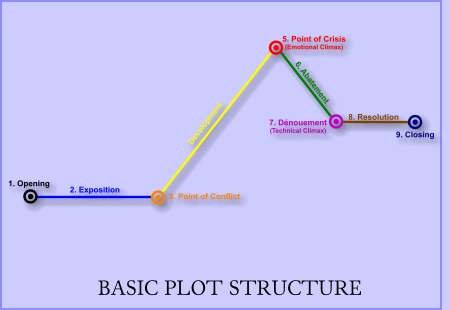http://www.cibacs.org/teacherpages/jbronkar/PDFs/Brave%20New%20World%20prompt.pdf
A Difference of Opinion About Utopia:
Compare & conrast the views that at least three characters have of the Brave New World they live(d) in. What about their upbringing has lead to their contrasting opinions of specific aspects of this world? Ideas to consider: How does each character view identity, disease, censorship, history, old age, drugs, brainwashing etc.Why do some "fit in" while others don't?
I want to be like water. I want to slip through fingers, but hold up a ship.
Thursday, February 20, 2014
Thursday, February 13, 2014
Lit. Terms: List #6
simile: a figure of speech in which two unlike things are explicitly compared
soliloquy: the act of talking while or as if alone
spiritual: of. pertaining to, or consisting of spirit; religious song; closely akin to interests, outlook, attitude, etc.
speaker: a person who speaks; orator, lecturer
stereotype: a set form; a simplified & standardized conception or image invested with special meaning & held in common by members of a group
stream of consciousness: interior monologue; manner of writing in which a character's thoughts or perceptions are presented as occurring in random form, w/o regard for logical sequences, syntactic structure, distinctions between various levels of reality, or the like
structure: the relationship or organization of the component parts of a work of art or literature
style: a particular, kind, sort or type, as w/ reference to form, appearance or character
subordination: the act of placing in a lower rank or position
surrealism: a movement in art & literature in the 1920's, which developed esp from dada, characterized by the evocative juxtaposition of incongruous images in order to include unconscious & dream elements
suspension of disbelief: a willingness to suspend one's critical faculties & believe the unbelievable; sacrifice of realism & logic for the sake of enjoyment
symbol: something that represents or stands for something else, usually by convention or association, especially a material object used to represent something abstract
synesthesia: a sensation produced in one modality when a stimulus is applied to another modality, as when the hearing of a certain sound induces the visualization of a certain color
syntax: the study of patterns of formations of sentences & phrases from words
theme: a unifying or dominant idea, motif, etc.
thesis: a proposition stated or put forward for consideration, especially one to be discussed or proved to be maintained against objections
tone: a particular quality, way of sounding, modulation or tone of voice as expressive of some meaning, feeling, spirit, etc.
tongue in cheek:
tragedy: a dramatic composition, often in verse, dealing w/ a serious or somber theme, typically that of a great person destined through a flaw of a character or conflict w/ some underlying force, as fate or society, to downfall or destruction
understatement: the act or an instance of stating something in restrained terms, or less than it is
vernacular: expressed or written in a native language or place , as literary works
voice: to give utterance or expression to; declare, proclaim
zeitgeist: the spirit of the time; general trend, thought or feeling characteristic of a particular time period
soliloquy: the act of talking while or as if alone
spiritual: of. pertaining to, or consisting of spirit; religious song; closely akin to interests, outlook, attitude, etc.
speaker: a person who speaks; orator, lecturer
stereotype: a set form; a simplified & standardized conception or image invested with special meaning & held in common by members of a group
stream of consciousness: interior monologue; manner of writing in which a character's thoughts or perceptions are presented as occurring in random form, w/o regard for logical sequences, syntactic structure, distinctions between various levels of reality, or the like
structure: the relationship or organization of the component parts of a work of art or literature
style: a particular, kind, sort or type, as w/ reference to form, appearance or character
subordination: the act of placing in a lower rank or position
surrealism: a movement in art & literature in the 1920's, which developed esp from dada, characterized by the evocative juxtaposition of incongruous images in order to include unconscious & dream elements
suspension of disbelief: a willingness to suspend one's critical faculties & believe the unbelievable; sacrifice of realism & logic for the sake of enjoyment
symbol: something that represents or stands for something else, usually by convention or association, especially a material object used to represent something abstract
synesthesia: a sensation produced in one modality when a stimulus is applied to another modality, as when the hearing of a certain sound induces the visualization of a certain color
syntax: the study of patterns of formations of sentences & phrases from words
theme: a unifying or dominant idea, motif, etc.
thesis: a proposition stated or put forward for consideration, especially one to be discussed or proved to be maintained against objections
tone: a particular quality, way of sounding, modulation or tone of voice as expressive of some meaning, feeling, spirit, etc.
tongue in cheek:
tragedy: a dramatic composition, often in verse, dealing w/ a serious or somber theme, typically that of a great person destined through a flaw of a character or conflict w/ some underlying force, as fate or society, to downfall or destruction
understatement: the act or an instance of stating something in restrained terms, or less than it is
vernacular: expressed or written in a native language or place , as literary works
voice: to give utterance or expression to; declare, proclaim
zeitgeist: the spirit of the time; general trend, thought or feeling characteristic of a particular time period
Wednesday, February 12, 2014
RESOURCE FOR MY MASTERPIECE
I want to be able to travel across the globe, learn & help others. This site is the International Student Volunteers program. This will provide me with the experiences I seek & do what I love.
http://www.isvolunteers.org/
http://www.isvolunteers.org/
HAVTA/WANNA
As of now in high school we are following the curriculum that the states requires (HAVTA), for the most part. The basics: mathematics, literature, writing, social sciences, etc. These core classes have little comparison for what I actually WANNA do & study. What really peaks my interest are helping others, social media, traveling & experiencing life. Of course there are some underlying principles that are in these various things from my core classes, but so far there is not an actual class, that I have discovered in high school, that can teach me these things.
Everyday in an opportunity to learn, whether it be by succeeding or failing. By these two things we essentially grow. We evaluate the situation in front of us & figure out how we can go from there. I believe that one is able to carry this with them in life. I believe that one's core values stay with them as they grow & experience life & alter them to see fit. There is ultimately no rapid & magical transformation, just a steady growth.
I balance the things that I WANNA do & the things that I HAVTA to do by doing the things I want to first. Strange, I know. This way I can satiate my craving & get it out of the way so that I can put my complete focus on my tasks at hand. I hope to raise the bar of expectations gradually as I continue on in life. I do not want to be pressured & stressed & not get the end result that I would like. I will work at a pace that I am most comfortable with & then push myself to see how far I am able to go. Maybe this will all change, who knows? Only time will tell. I will just stick with this strategy for now.
Thursday, February 6, 2014
Lit. Terms: List #5
parallelism: agreement in direction, tendency, or character; grammar repetition of a syntactic construction in successive sentences for rhetorical effect
 parody: a humorous or satirical imitation of a serious place of literature or writing
parody: a humorous or satirical imitation of a serious place of literature or writing
 pathos: appeal to emotions
pathos: appeal to emotions
 pedantry: the habit or an instance of being a pedant, especially in the display of useless knowledge or minute observance of petty rules or details; pretension, precision
pedantry: the habit or an instance of being a pedant, especially in the display of useless knowledge or minute observance of petty rules or details; pretension, precision
 personification: the attribution of human nature or character to human animals, inanimate objects, or abstract notions, especially as a rhetorical figure
personification: the attribution of human nature or character to human animals, inanimate objects, or abstract notions, especially as a rhetorical figure
 plot: storyline the plan, scheme, or main story of a literary or dramatic work, as a play, novel, or short story
plot: storyline the plan, scheme, or main story of a literary or dramatic work, as a play, novel, or short story
 poignant: keenly distressing to the feelings; heartbreaking, penetrating
poignant: keenly distressing to the feelings; heartbreaking, penetrating
 point of view: the position of a narrator in relation to the story, as indicated by the narrator's outlook from which the events are depicted & by the attitude towards the characters; 1st, 2nd, & 3rd person
point of view: the position of a narrator in relation to the story, as indicated by the narrator's outlook from which the events are depicted & by the attitude towards the characters; 1st, 2nd, & 3rd person

 post modernism: any of a number of trends or movements in the arts or literature developing in the 1970's in reaction to or rejection to dogma, principles, or practices of established modernism; playful illusion, decoration or complexity
post modernism: any of a number of trends or movements in the arts or literature developing in the 1970's in reaction to or rejection to dogma, principles, or practices of established modernism; playful illusion, decoration or complexity

prose: the ordinary form of spoken or written language, w/o metrical structure as distinguished from poetry or verse
 protagonist: the leading character, hero/heroine of a drama or other literary work
protagonist: the leading character, hero/heroine of a drama or other literary work
 pun: the humorous use of a word or phrase so as to emphasize or suggest its different meanings or applications, or the use of works that are alike or nearly alike in sound, but in a different meaning; play on words
pun: the humorous use of a word or phrase so as to emphasize or suggest its different meanings or applications, or the use of works that are alike or nearly alike in sound, but in a different meaning; play on words
 purpose: the reason for which something exists or done, made, used, etc.; an intended or desired result
purpose: the reason for which something exists or done, made, used, etc.; an intended or desired result
 realism: a manner of treating a subject matter that represents a careful description of everyday life, usually of the middle & lower classes; a theory of writing in which the ordinary, familiar, or mundane aspects of life are represented in a straightforward or matter-of-fact manner that is presumed to reflect life as it actually is
realism: a manner of treating a subject matter that represents a careful description of everyday life, usually of the middle & lower classes; a theory of writing in which the ordinary, familiar, or mundane aspects of life are represented in a straightforward or matter-of-fact manner that is presumed to reflect life as it actually is
 refrain:a phrase or verse recurring at intervals in a song or poem, especially at the end of each stanza; chorus
refrain:a phrase or verse recurring at intervals in a song or poem, especially at the end of each stanza; chorus
 requiem: any musical service, hymn, or dirge for the repose of the dead
requiem: any musical service, hymn, or dirge for the repose of the dead
 resolution: the act of determining upon an action or course of action, method, procedure, etc.
resolution: the act of determining upon an action or course of action, method, procedure, etc.
 restatement: to state again or in a new way
restatement: to state again or in a new way
 rhetoric: (in writing or speech) the undue use of exaggeration or display; the study of a technique of using language effectively
rhetoric: (in writing or speech) the undue use of exaggeration or display; the study of a technique of using language effectively
 rhetorical question: a question solely to produce an effect or use an assertion & not to elicit a reply
rhetorical question: a question solely to produce an effect or use an assertion & not to elicit a reply
 rising action: a related series of incidents in a literary plot that builds towards the point of greatest interest
rising action: a related series of incidents in a literary plot that builds towards the point of greatest interest
 romanticism: Romantic style or movement in literature & art, or adherence to its principles (contrasted w/ Classicism)
romanticism: Romantic style or movement in literature & art, or adherence to its principles (contrasted w/ Classicism)
 satire: the use of irony, sarcasm, ridicule, or the like, in exposing, denouncing, or deriding vice, folly, etc.
satire: the use of irony, sarcasm, ridicule, or the like, in exposing, denouncing, or deriding vice, folly, etc.
 scansion: the metrical analysis of verse
scansion: the metrical analysis of verse
 setting: the surroundings or environment of anything
setting: the surroundings or environment of anything
























Sunday, February 2, 2014
THE TIME OF MY LIFE
When I came into the classroom I asked my classmates what I had missed the day before b/c I was absent & sick. Erica & Izamar attempted to inform me of all they knew of "free play" & Derrida. It was easy to understand it for the most part, but we had barely scratched the surface. Then we continued to discuss the most efficient ways to take notes, even though not every form of note-taking works for everyone. As we began to touch on Derrida, the substitute gave us insight of what he knew & his teachings. I came to the conclusion that Derrida's philosophy was a circumlocution of sorts. It was very dense & confusing, so I hope to have a clear understanding when we return to class this next week.
Subscribe to:
Posts (Atom)